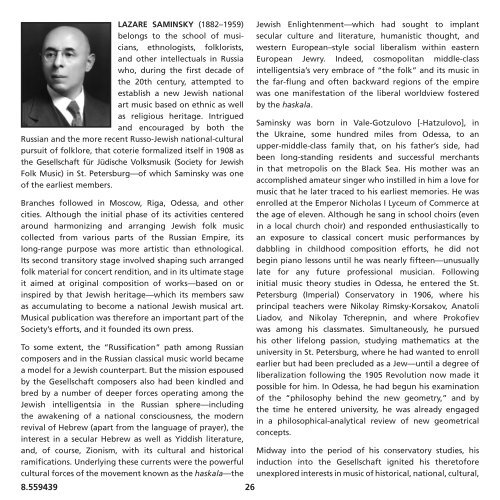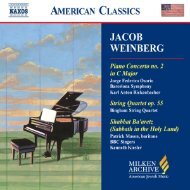Download Liner Notes PDF - Milken Archive of Jewish Music
Download Liner Notes PDF - Milken Archive of Jewish Music
Download Liner Notes PDF - Milken Archive of Jewish Music
Create successful ePaper yourself
Turn your PDF publications into a flip-book with our unique Google optimized e-Paper software.
LAZARE SAMINSKY (1882–1959)belongs to the school <strong>of</strong> musicians,ethnologists, folklorists,and other intellectuals in Russiawho, during the first decade <strong>of</strong>the 20th century, attempted toestablish a new <strong>Jewish</strong> nationalart music based on ethnic as wellas religious heritage. Intriguedand encouraged by both theRussian and the more recent Russo-<strong>Jewish</strong> national-culturalpursuit <strong>of</strong> folklore, that coterie formalized itself in 1908 asthe Gesellschaft für Jüdische Volksmusik (Society for <strong>Jewish</strong>Folk <strong>Music</strong>) in St. Petersburg—<strong>of</strong> which Saminsky was one<strong>of</strong> the earliest members.Branches followed in Moscow, Riga, Odessa, and othercities. Although the initial phase <strong>of</strong> its activities centeredaround harmonizing and arranging <strong>Jewish</strong> folk musiccollected from various parts <strong>of</strong> the Russian Empire, itslong-range purpose was more artistic than ethnological.Its second transitory stage involved shaping such arrangedfolk material for concert rendition, and in its ultimate stageit aimed at original composition <strong>of</strong> works—based on orinspired by that <strong>Jewish</strong> heritage—which its members sawas accumulating to become a national <strong>Jewish</strong> musical art.<strong>Music</strong>al publication was therefore an important part <strong>of</strong> theSociety’s efforts, and it founded its own press.To some extent, the “Russification” path among Russiancomposers and in the Russian classical music world becamea model for a <strong>Jewish</strong> counterpart. But the mission espousedby the Gesellschaft composers also had been kindled andbred by a number <strong>of</strong> deeper forces operating among the<strong>Jewish</strong> intelligentsia in the Russian sphere—includingthe awakening <strong>of</strong> a national consciousness, the modernrevival <strong>of</strong> Hebrew (apart from the language <strong>of</strong> prayer), theinterest in a secular Hebrew as well as Yiddish literature,and, <strong>of</strong> course, Zionism, with its cultural and historicalramifications. Underlying these currents were the powerfulcultural forces <strong>of</strong> the movement known as the haskala—the8.559439 26<strong>Jewish</strong> Enlightenment—which had sought to implantsecular culture and literature, humanistic thought, andwestern European–style social liberalism within easternEuropean Jewry. Indeed, cosmopolitan middle-classintelligentsia’s very embrace <strong>of</strong> “the folk” and its music inthe far-flung and <strong>of</strong>ten backward regions <strong>of</strong> the empirewas one manifestation <strong>of</strong> the liberal worldview fosteredby the haskala.Saminsky was born in Vale-Gotzulovo [-Hatzulovo], inthe Ukraine, some hundred miles from Odessa, to anupper-middle-class family that, on his father’s side, hadbeen long-standing residents and successful merchantsin that metropolis on the Black Sea. His mother was anaccomplished amateur singer who instilled in him a love formusic that he later traced to his earliest memories. He wasenrolled at the Emperor Nicholas I Lyceum <strong>of</strong> Commerce atthe age <strong>of</strong> eleven. Although he sang in school choirs (evenin a local church choir) and responded enthusiastically toan exposure to classical concert music performances bydabbling in childhood composition efforts, he did notbegin piano lessons until he was nearly fifteen—unusuallylate for any future pr<strong>of</strong>essional musician. Followinginitial music theory studies in Odessa, he entered the St.Petersburg (Imperial) Conservatory in 1906, where hisprincipal teachers were Nikolay Rimsky-Korsakov, AnatoliLiadov, and Nikolay Tcherepnin, and where Prok<strong>of</strong>ievwas among his classmates. Simultaneously, he pursuedhis other lifelong passion, studying mathematics at theuniversity in St. Petersburg, where he had wanted to enrollearlier but had been precluded as a Jew—until a degree <strong>of</strong>liberalization following the 1905 Revolution now made itpossible for him. In Odessa, he had begun his examination<strong>of</strong> the “philosophy behind the new geometry,” and bythe time he entered university, he was already engagedin a philosophical-analytical review <strong>of</strong> new geometricalconcepts.Midway into the period <strong>of</strong> his conservatory studies, hisinduction into the Gesellschaft ignited his theret<strong>of</strong>oreunexplored interests in music <strong>of</strong> historical, national, cultural,
















